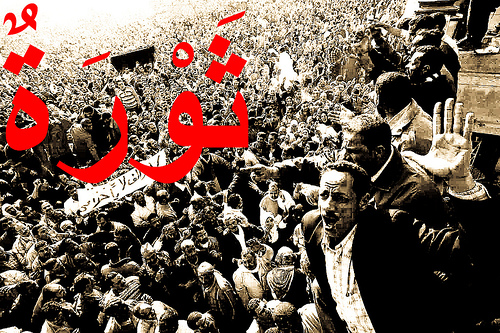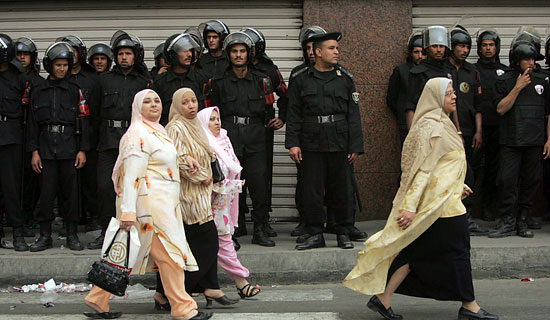
(“Thowra,” which in Arabic literally means “revolution”)
Hey All,
I’m Fauzia and I guest blogged here at Feministe a while back. I initially wrote to Jill about this story as I thought she’d have some good commentary on the issue. But after some thought, and an offer from Jill to return to my guest-blog status for just one more post I figured it might be easier if I wrote about this myself.
Disclaimer: I’m an American currently living in Egypt (Cairo) working at a center that promotes civic engagement and researches the rising sector of Arab philanthropy. I work downtown, near Midan Tahrir (literally “Freedom Square”). In the last 9 months that I’ve been living in Cairo I’ve managed to witness the absolute poverty this country is living in. On the other hand, I’ve managed to witness the growing gap between the rich and poor. Students at the American University, for the most part, are the upper echelon of Egyptian society (note: I’m not saying that they are ALL upper class Egyptians, but for the most part…). I’ve only lived here for 9 months so I’m not professing that I have a huge handle on the situation. So here it goes…
I don’t know how much Western newspapers are covering this issue, but I’m sure by the end of the week they’ll be a few stories. I know that the hard copy of the International Herald Tribune covered this issue this morning (Monday) and online, again, a few minutes ago.
Yesterday (Sunday, April 6) was, essentially, a nationwide strike for many Egyptian workers and activists, in solidarity with the workers of Ghazl El-Mahalla, one of the biggest textile factories in Egypt. The growing problems of low wages and rising prices of food (especially bread and cooking oil) have pushed Egyptian society into a state of anger and frustration. The production and distribution of bread has led to, on many occasions, violence in bread lines. In one instance, a man was stabbed during an argument over bread distribution.
Before I go further, here is some logistical and basic information on the history of labor movements, the current strike (who initiated it, how it snowballed into a national call, etc.) The writer of these articles is Joel Beinin, a professor and head of the Middle East Studies department at the American University in Cairo. He links a few other articles that are pretty informative as well.
Yesterday’s strike, though, was a historical moment for Egypt. Though the country professes to be a “democracy,” (ironically Hosni Mubarak’s party is called “The National Democratic Party,”) it is pretty apparent that no such thing exists in the Egypt. Protests, strikes, and demonstrations have been completely outlawed in Egypt since the declaration of emergency law after the assassination of Anwar Sadat in 1981.
In fact, The American University in Cairo (one of the few academic institution that didn’t support the strike) sent a cautionary (yet amusing) email the day before the strike. It read as follows:
“We would like to advise the AUC [American University in Cairo] community that the university will be open and will operate as usual this coming Sunday, April 6, 2008.
As many of you are aware, a general strike has been called by several groups in Egypt and the university is encouraging the AUC community to be aware of the possibility of increased activity in Tahrir Square and to plan accordingly. Foreigners should also be aware that they should avoid getting involved in any demonstrations in any way — it is forbidden by the Egyptian authorities and may be dangerous.”
The Center I work at met several times to discuss whether going on strike, along with the workers and activists of Egypt, would be an appropriate action as we’re linked to the University. In the end, we believed it was part of our mission, as a Center that promotes social justice in all areas, to go on strike. Yesterday, I stayed home, and as I walked around the streets of Cairo, I realized…almost everyone else was at home too.
It was truly an amazing sight. The once insanely busy streets of Cairo were completely empty. It was eerie and silent…like a ghost town. A sandstorm (one of the first of the sandstorm season, which is affectionately called “khamaseen” [fifty] in Arabic to symbolize the number of days sandstorms last) blew through the city, followed by rain (??). The sky was orange and the streets were empty minus the obviously beefed-up security everywhere. I felt like I was witnessing a moment of absolute frustration and anger with the Mubarak regime.
I’ve heard many ex-pats and tourists who come here commenting on the “apathy” of the Egyptian people. And I have to say…yesterday’s strike was nothing close to apathy. I don’t want to fall into the typical Bush trap of saying that “we” need to bring democracy to “them.” “We” (whoever “we” might be) don’t need to. The people of Egypt are crying out for it. They are desperate for a regime change. But in a country where only the top of the top get access to billions of dollars of aid that comes in from the States every day (Egypt receives the second largest amount of aid after Israel, from the States) it’s almost unbearable to think about the families that live on 130 Egyptian pounds a month, and that’s a doctor’s family. 130 Egyptian pounds comes out to about 23 US dollars a month. And in Egypt, even in Egypt, that’s not NEARLY enough to live on.
The US Embassy issued a statement to all Americans in Cairo warning them that taking part in protests would lead to arrests and detainments. Unsurprisingly, the US Embassy didn’t support the strike or the grievances of the workers involved. Shocker. What is the most frustrating part of all of this is that I’m an American who is living in this country, watching all of this happen before my own eyes, and wondering why “we’re” so intent on installing democracies in Iraq and Afghanistan, yet we allow the atrocities that happen every day in police stations and on the street to happen in Egypt. Why isn’t Bush addressing this? It’s frustrating at best. Perhaps I’m too naïve or too idealistic, but it’s amazing that a country that is crying out for democracy and supposedly is one, is headed by a man who cannot even allow protests and strikes as a form of non violent civil disobedience.
The enormous gap between rich and poor, in Egypt, is outrageous. Corruption is rampant throughout the government and is a well known fact. Egyptians have come to accept this norm, but their inability to live, even in poorest of the poor conditions has reached rock bottom.
One interesting and hopeful part of this whole ordeal and movement is the uniting of both men and women against the regime. Women who work in factories have united with men against the absolutely ridiculous wages they are receiving. And I’m sure you can imagine that if a doctor of 20 years is making 130 Egyptian pounds a month, a female factory worker is undoubtedly living in poverty. I’ve read in several places that almost 40% of Egyptians live below the poverty line, earning less that 2 US dollars a day. Women are standing up and rallying with their male colleagues. They are leading small movements all over the country. University students from Cairo University, Ain Shams University and Helwan University boycotted classes on Sunday. Teachers cancelled lectures. Stores were shut down. The young people, the women, the doctors, the teachers, the lawyers are raising their voices and demand to be heard.
At the end of all of this, Egyptian bloggers are writing that the police crackdown on the strike aborted the entire event. Workers were threatened and forced to go back to work, and the Egyptian government is pronouncing the event as a complete failure. The end of the strike, however, doesn’t mean the end of the struggle for better wages, subsidized food, and in general, a better life for most Egyptians. I urge you all to read the few blogs I’ve linked at the bottom of this entry and learn about the issues Eygptians are facing every day. Things like torture and police brutality happen on a daily basis in Egypt. The country that, ironically, was once called “the bread basket of the world” is now unable to feed its own people.
Below are some links to informative, usually leftist, blogs from Egyptians. These blogs feature some amazing photos and the IHT has a pretty good one in its article.
One of my personal favorites in the Egyptian blogosphere is: http://arabist.net/arabawy
Arabawy also has some great photos that capture the protests at Cairo University.
But the rest are just as informative as well.
http://43arb.info/meit/?p=1138
http://baheyya.blogspot.com/
http://arabist.net/archives/2008/04/07/muslim-brothers-to-boycott-municipal-elections/
